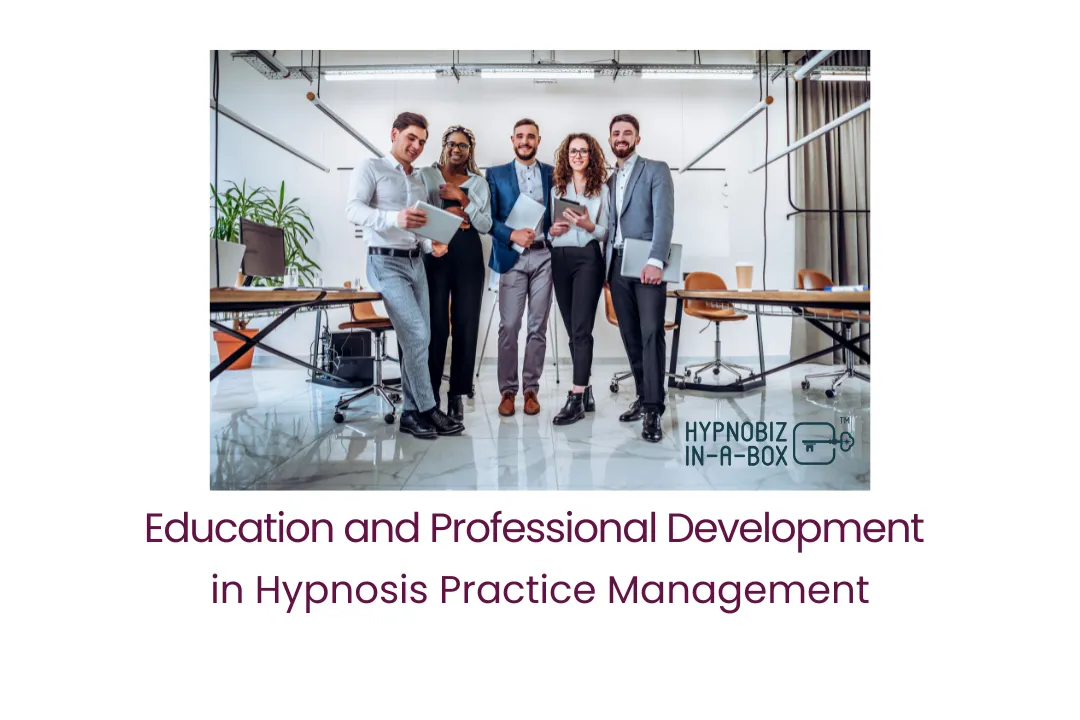HypnoBiz-in-a-Box™ Blog

Enhance Your Hypnotherapy Business Management Skills with Us
Unlocking Success: The Role of Continuing Education in Hypnosis Practice Management
Continuing education is vital to professional development in any field, and the realm of hypnosis practice management is no exception. As practitioners strive to enhance their skills and stay abreast of the latest developments, ongoing education becomes essential. This blog post delves into the significance of continuing education in hypnosis practice management, exploring how it can elevate practitioners' abilities and benefit their clients.
The Evolution of Hypnosis Practice Management
With the help of developments in psychology, neuroscience, and technology, hypnosis practice management has significantly changed over time. What was once considered a mysterious art has become a well-defined and scientifically grounded discipline. As the field evolves, practitioners must adapt and expand their knowledge base to effectively serve their clients. Continuing education provides an avenue for staying updated on emerging techniques, ethical considerations, and industry trends.
Transitioning from traditional methods to modern, evidence-based practices requires ongoing learning and adaptation. By engaging in continuing education, practitioners can refine their skills, integrate new methodologies, and ensure they provide their clients with the highest quality of care. Whether mastering new hypnotic induction techniques or learning effective strategies for client management, continuing education equips practitioners with the tools they need to thrive in today's competitive landscape.
The Benefits of Continuing Education for Hypnosis Practitioners
Enhance Practice Management Skills: Continuing education offers many benefits for hypnosis practitioners seeking to enhance their practice management skills. One of the primary advantages is the opportunity for professional growth and development. By participating in workshops, seminars, and certification programs, practitioners can expand their knowledge, sharpen their skills, and earn recognition within the field.
Foster Creativity: Continuing education fosters innovation and creativity in hypnosis practice management. As practitioners explore new ideas and techniques, they can adapt them to suit their unique practice styles and client needs. This innovative mindset enhances the quality of care and keeps practitioners engaged and passionate about their work.
Complex Cases: Furthermore, continuing education instills confidence in practitioners, empowering them to tackle complex cases and navigate challenging situations with competence and poise. With each new skill acquired and every milestone achieved through continuing education, practitioners gain a deeper sense of self-assurance in their abilities, which ultimately translates to improved client outcomes.
Navigating Continuing Education Options
With abundant continuing education options, choosing the right path can be overwhelming for hypnosis practitioners. The possibilities are vast, from online courses and webinars to in-person workshops and conferences. Practitioners should consider their specific learning objectives, preferred learning styles, and budgetary constraints when selecting continuing education opportunities.
Additionally, practitioners should prioritize programs run by qualified experts in the field and accredited by reputable organizations. Accredited programs ensure quality standards and adherence to ethical guidelines, providing practitioners with valuable insights and resources to enhance their practice management skills.
Furthermore, practitioners should seek opportunities for networking and collaboration within the continuing education landscape. Connecting with peers and mentors facilitates knowledge exchange and opens doors to potential partnerships and career opportunities.
Overcoming Challenges in Continuing Education
While continuing education offers numerous benefits, it has its challenges. Time constraints, financial limitations, and accessibility issues can pose barriers to participation for some practitioners. Moreover, balancing continuing education with work and personal commitments requires careful planning and prioritization.
To overcome these challenges, practitioners can explore flexible learning options such as online courses and self-paced programs that accommodate their schedules. Additionally, seeking out scholarships, grants, or employer-sponsored education programs can help alleviate the financial burdens associated with continuing education.
Furthermore, practitioners can leverage technology to overcome geographical barriers and access educational resources worldwide. Virtual conferences, webinars, and online forums provide opportunities for learning and networking without the need for travel.
Evaluating the Return on Investment
Continuing education is an investment in one's professional growth and success. However, practitioners may wonder about the tangible returns on their investment in terms of improved client outcomes and increased revenue. Evaluating continuing education's return on investment (ROI) requires a comprehensive assessment of various factors, including skill acquisition, client satisfaction, and practice growth.
By tracking key performance indicators such as client retention rates, referral rates, and revenue growth, practitioners can gauge the impact of continuing education on their practice. Additionally, soliciting feedback from clients and colleagues can provide valuable insights into the effectiveness of newly acquired skills and techniques.
Moreover, practitioners should view continuing education as a long-term investment rather than a short-term gain. While the immediate benefits may not always be apparent, the cumulative effect of ongoing learning and skill development can significantly enhance practitioners' professional capabilities and elevate their standing within the field.
Ethical Considerations in Continuing Education
Ethical considerations play a crucial role in continuing education for hypnosis practitioners. Practitioners must adhere to ethical guidelines and professional standards to pursue ongoing learning. This includes maintaining confidentiality, respecting clients' autonomy, and avoiding conflicts of interest.
Furthermore, practitioners should critically evaluate the content and methodology of continuing education programs to ensure they align with ethical principles and promote best practices in hypnosis practice management. Engaging in continuing education that is evidence-based, culturally sensitive, and inclusive enhances practitioners' ability to provide ethical and effective care to diverse client populations.
The Future of Continuing Education in Hypnosis Practice Management
As the field of hypnosis practice management continues to evolve, the importance of continuing education will only grow stronger. Rapid advancements in technology, neuroscience, and psychology will necessitate ongoing learning and adaptation for practitioners to remain at the forefront of the field.
Moreover, the increasing recognition of hypnosis as a legitimate therapeutic modality across various domains, including healthcare, mental health, and performance enhancement, will create new opportunities for continuing education and professional development. By embracing lifelong learning and staying curious about emerging trends and innovations, hypnosis practitioners can position themselves for continued success and make meaningful contributions to the field.
Elevate Your Practice with Continuing Education
In conclusion, continuing education is a cornerstone of success in hypnosis practice management. By investing in ongoing learning and professional development, practitioners can enhance their skills, innovate their approaches, and provide ethically sound and effective care to their clients. Whether it's mastering new techniques, staying updated on industry trends, or expanding professional networks, continuing education offers endless possibilities for growth and fulfillment in hypnosis practice management. Embrace the journey of lifelong learning, and watch as your practice thrives and evolves in tandem with your commitment to excellence.

